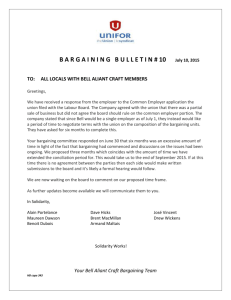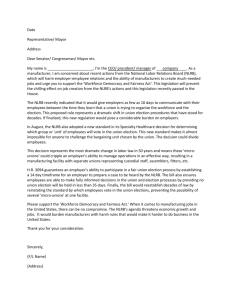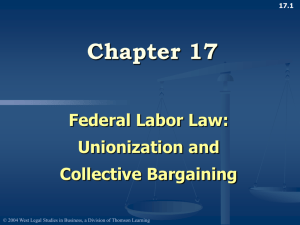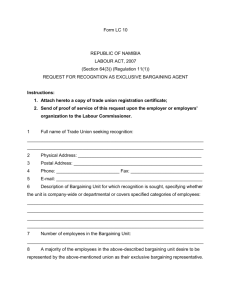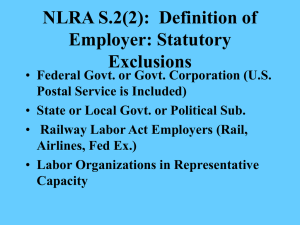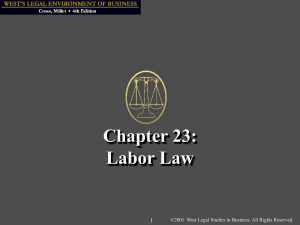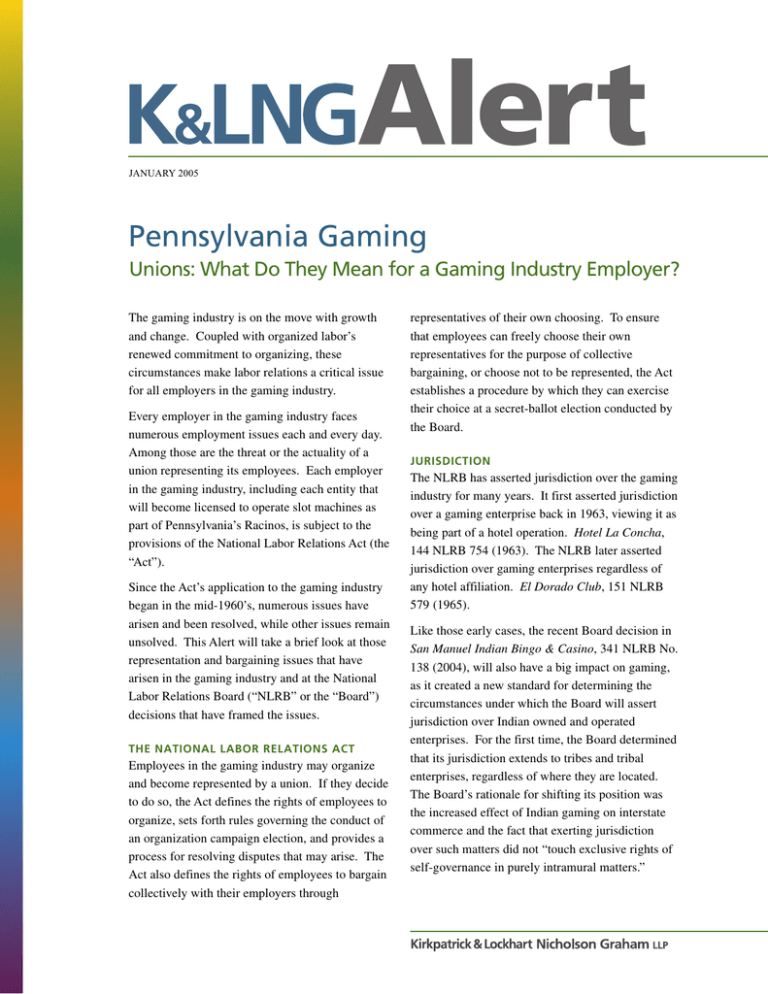
JANUARY 2005
Pennsylvania Gaming
Unions: What Do They Mean for a Gaming Industry Employer?
The gaming industry is on the move with growth
and change. Coupled with organized labor’s
renewed commitment to organizing, these
circumstances make labor relations a critical issue
for all employers in the gaming industry.
Every employer in the gaming industry faces
numerous employment issues each and every day.
Among those are the threat or the actuality of a
union representing its employees. Each employer
in the gaming industry, including each entity that
will become licensed to operate slot machines as
part of Pennsylvania’s Racinos, is subject to the
provisions of the National Labor Relations Act (the
“Act”).
Since the Act’s application to the gaming industry
began in the mid-1960’s, numerous issues have
arisen and been resolved, while other issues remain
unsolved. This Alert will take a brief look at those
representation and bargaining issues that have
arisen in the gaming industry and at the National
Labor Relations Board (“NLRB” or the “Board”)
decisions that have framed the issues.
THE NATIONAL LABOR RELATIONS ACT
Employees in the gaming industry may organize
and become represented by a union. If they decide
to do so, the Act defines the rights of employees to
organize, sets forth rules governing the conduct of
an organization campaign election, and provides a
process for resolving disputes that may arise. The
Act also defines the rights of employees to bargain
collectively with their employers through
representatives of their own choosing. To ensure
that employees can freely choose their own
representatives for the purpose of collective
bargaining, or choose not to be represented, the Act
establishes a procedure by which they can exercise
their choice at a secret-ballot election conducted by
the Board.
JURISDICTION
The NLRB has asserted jurisdiction over the gaming
industry for many years. It first asserted jurisdiction
over a gaming enterprise back in 1963, viewing it as
being part of a hotel operation. Hotel La Concha,
144 NLRB 754 (1963). The NLRB later asserted
jurisdiction over gaming enterprises regardless of
any hotel affiliation. El Dorado Club, 151 NLRB
579 (1965).
Like those early cases, the recent Board decision in
San Manuel Indian Bingo & Casino, 341 NLRB No.
138 (2004), will also have a big impact on gaming,
as it created a new standard for determining the
circumstances under which the Board will assert
jurisdiction over Indian owned and operated
enterprises. For the first time, the Board determined
that its jurisdiction extends to tribes and tribal
enterprises, regardless of where they are located.
The Board’s rationale for shifting its position was
the increased effect of Indian gaming on interstate
commerce and the fact that exerting jurisdiction
over such matters did not “touch exclusive rights of
self-governance in purely intramural matters.”
Of particular interest to those in the gaming industry
looking to expand into Pennsylvania is the
jurisdictional issue concerning slot machine
enterprises that are part of racetracks, i.e. “Racinos.”
The NLRB historically has not asserted jurisdiction
over the horseracing industry,1 but has begun to
assert its jurisdiction over racino-type operations
that are substantially comprised of slot machine
operations. The two key factors are: (1) what
duties does the employee primarily perform – those
related to the slot operations or those related to the
track operations; and (2) how closely integrated are
the slot and track operations? In Delaware Racing
Association, 325 NLRB 156 (1997), and Racing
Association of Central Iowa, 324 NLRB 550
(1997), the Board concluded that if the employees’
job functions relate predominately to the casino
enterprise and there was no significant functional
integration between the casino and the track, then
the casino operation did not involve the horseracing
industry and the NLRB would assert jurisdiction
over that portion of the operation.
These decisions suggest that the NLRB is likely to
assert jurisdiction over those employers operating
slot machines at Pennsylvania’s Racinos. The
question then becomes: which employees may
unionize?
HOW IS THE APPROPRIATENESS
OF A UNIT DETERMINED?
The appropriateness of a bargaining unit is
generally determined on the basis of a community
of interest of the employees involved. Those who
have the same or substantially similar interests
concerning wages, hours and working conditions
are grouped together in a bargaining unit. Other
factors that are commonly considered include:
1. Any history of collective bargaining between
management and that group of employees;
2. The desires of the employees; and
3. How the employer has structured the work force.
There is no absolutely “right” or “wrong”
bargaining unit, and, with some limitations, the unit
favored by the employees and union is given some
deference.
EXAMPLES OF BARGAINING UNITS
DEEMED APPROPRIATE
Below are summaries of recent bargaining units in
which employers and unions have held
representation elections in gaming and related
industries:
Q
Q
WHAT IS AN APPROPRIATE
BARGAINING UNIT?
When faced with representation issues, often one of
the first topics that must be addressed is what is the
appropriate bargaining unit or “unit of employees.”
A “unit of employees” is a group of two or more
employees who share a community interest and may
reasonably be grouped together for purposes of
collective bargaining. The NLRB has the
discretion, subject to certain limitations, to
determine whether a group of employees is an
appropriate bargaining unit.
Q
All casino employees in general as one unit;
Full-time and regular part-time table game
dealers (this is particularly interesting because
dealers have traditionally resisted organizational
efforts, but are common targets of unions seeking
to represent them in collective bargaining);
Cashiers – decisions vary as to whether the
appropriate cashier unit is one combined unit or
multiple cashier units;
Q
Engineers and maintenance personnel;
Q
Slot technicians and apprentices;
Q
Maintenance engineers;
Q
Q
Full-time and regular part-time roller coaster
mechanics;
Full-time and regular part-time engineers and
maintenance personnel, including ride engineers;
1 Under certain circumstances, the Pennsylvania Labor Relations Board may assert jurisdiction over the horse racing operations.
2 JANUARY 2005
KIRKPATRICK & LOCKHART NICHOLSON GRAHAM LLP
Q
Q
Q
Q
Q
Q
Q
Full-time and regular part-time engineering
(maintenance) personnel;
Full-time and regular part-time valet parking
attendants;
Full-time and/or regular part-time security
officers performing guard duties;
Building maintenance engineers;
Slot mechanics in the slot repair department may
be separated from other repair employees such as
maintenance;
Full-time and regular part-time receiving
attendants, lead receivers, laborers and lead
laborers; and
Maintenance engineers, painters, upholsterers,
carpenters, electricians and laborers.
THE ELECTION
Although under certain circumstances an employer
may voluntarily recognize a union that provides
evidence that it represents a majority of the
employees in an appropriate bargaining unit, the
majority of employers wish to have their employees
vote in an NLRB conducted election to determine
whether a union will represent the employees. The
details of the election process are beyond the scope
of this Alert, but if it so desires, an employer has the
right to vigorously campaign against the union.
THE BARGAINING REPRESENTATIVE
AND THE EMPLOYER
Once an appropriate unit has been recognized by
the employer or certified by the NLRB, the selected
union becomes the exclusive representative
bargaining agent for all employees in the unit.
Once a collective bargaining representative has been
designated or selected by its employees, it is illegal
for an employer to bargain with individual
employees, with a group of employees, or with
another employee representative.
Few functions for a client in the field of labor
relations have such an important and lasting effect
as negotiations with a union toward reaching a
collective bargaining agreement. The collective
bargaining agreement becomes the overriding
3 JANUARY 2005
document that governs the relationship between the
employer and its employees and the union
representing its employees for the duration of the
term of the agreement.
NEUTRALITY AGREEMENTS
One of the hottest trends in collective bargaining is
organized labor’s increased attempts to circumvent
the traditional NLRB election process and proceed
straight to recognition by the employer and
bargaining on a contract by seeking to obtain
neutrality agreements. “Neutrality agreements”
take many forms and sizes. Essentially, they require
an employer to remain neutral in the face of a union
organizing drive at one of the employer’s
unorganized facilities or departments. A typical
neutrality agreement may require the signatory
employer to not only maintain campaign neutrality
but also:
Q
Q
Q
Q
Q
Q
Q
Q
Q
To agree to limit communications to employees
about the union;
To extend preferential hiring rights to
unorganized facilities;
To meet with the union and discuss issues such
as appropriate units, supervisory employees, and
excluded employees;
To provide the union an early list of names and
addresses of the employees in the agreed-to unit;
To grant the union access to the facilities of the
target to distribute union literature and meet with
employees;
To recognize the union based on an authorization
card majority (or some higher percentage),
without an NLRB election;
To agree to start contract negotiations for newly
organized units within a specified time frame;
To extend coverage of the neutrality agreement
to “affiliates” of the signatory company; and
To agree not to create another entity in the same
industry without ensuring it adopts the neutrality
agreement.
The NLRB has pending before it two significant
cases examining neutrality agreements but has
KIRKPATRICK & LOCKHART NICHOLSON GRAHAM LLP
recently indicated that the much anticipated rulings
in Dana Corp. and Metaldyne Corp. are not likely
to be provided until the spring of 2005. Although
the subject of neutrality agreements has thus far not
been fully examined by the NLRB, reviewing courts
have generally determined that normal neutrality
clauses, once agreed to, are enforceable in federal
court.
coupled with organized labor’s renewed
commitment to organizing, make it a harrowing
time for employers dealing with workplace issues.
One thing is likely to remain a constant, and that is
that employers will continue to need effective legal
representation when dealing with the NLRB and
organized labor to avoid the traps, intentional and
unintentional, that will be present.
If those decisions are a foreboding of how the
NLRB will decide Dana Corp. and Metaldyne
Corp., an employer who enters into a neutrality
agreement will likely see a court enforce the
employer’s commitments unless the issue implicates
the NLRB’s representation processes or violates a
statutory provision of the Act.
Hayes C. Stover
412.355.6476
hstover@klng.com
Von E. Hays
214.939.4959
vhayes@klng.com
Jacqueline Jackson-DeGarcia
CONCLUSION
717.231.5877
The gaming industry is growing and dynamic. The
changes in the industry and the modern workforce,
jjacksondegarcia@klng.com
If you have questions or would like more information about K&LNG’s Betting and Gaming Practice, please
contact one of our lawyers listed below:
Harrisburg
London
David R. Overstreet
Warren L. Phelops
717.231.4517
+44.20.7360.8129
doverstreet@klng.com
wphelops@klng.com
www
w.. k l n g . c o m
BOSTON
■
DALLAS
■
HARRISBURG
■
LONDON
■
LOS ANGELES
■
MIAMI
■
NEWARK
■
NEW YORK
■
PITTSBURGH
■
SAN FRANCISCO
■
WASHINGTON
Kirkpatrick & Lockhart Nicholson Graham LLP (K&LNG) has approximately 950 lawyers and represents entrepreneurs, growth and middle market companies and leading FORTUNE 100 and FTSE 100
global corporations nationally and internationally.
K&LNG is a combination of two limited liability partnerships, each named Kirkpatrick & Lockhart Nicholson Graham LLP, one qualified in Delaware, U.S.A. and practicing from offices in Boston, Dallas,
Harrisburg, Los Angeles, Miami, Newark, New York, Pittsburgh, San Francisco and Washington and one incorporated in England practicing from the London office.
This publication/newsletter is for informational purposes and does not contain or convey legal advice. The information herein should not be used or relied upon in regard to any particular facts or circumstances
without first consulting a lawyer.
Unless otherwise indicated, the lawyers are not certified by the Texas Board of Legal Specialization.
Data Protection Act 1988 - We may contact you from time to time with information on Kirkpatrick & Lockhart Nicholson Graham LLP seminars and with our regular newsletters, which may be of interest to you.
We will not provide your details to any third parties. Please e-mail cgregory@klng.com if you would prefer not to receive this information.
© 2005 KIRKPATRICK & LOCKHART NICHOLSON GRAHAM LLP. ALL RIGHTS RESERVED.

